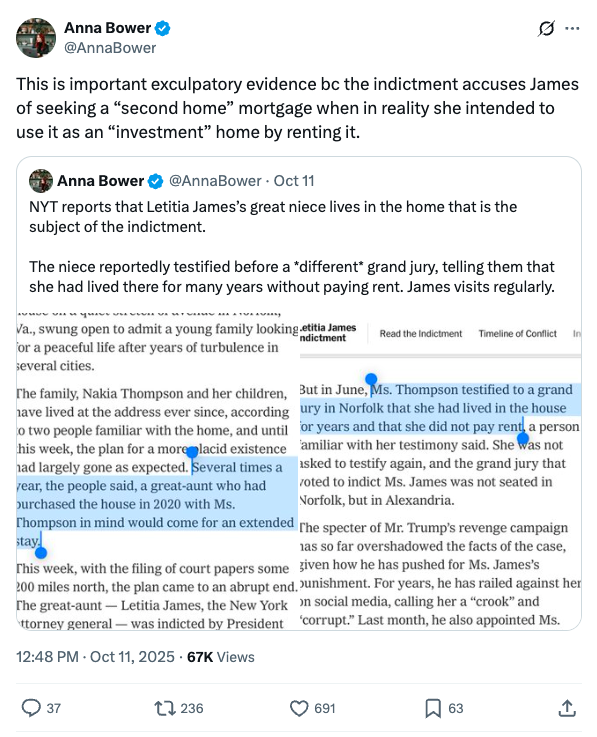I am not 100% sure what the story is here, but it seems to demonstrate that Trumps hand picked prosecutors are children who do not understand the functioning of the legal system.
My Signal exchange with the interim U.S. attorney about the Letitia James grand jury
It was 1:20 p.m. on the afternoon of Saturday, Oct. 11. I was lounging in my pajamas, idly scrolling through Netflix, having spent the morning reading news stories, occasionally tweeting, and watching TV. It was a rare day off.
Then my phone lit up with a notification. I glanced down at the message.
“Anna, Lindsey Halligan here,” it began.
Lindsey Halligan—the top prosecutor in the Eastern District of Virginia—was texting me. As it turned out, she was texting me about a criminal case she is pursuing against one of the president’s perceived political enemies: New York Attorney General Letitia James.
So began my two-day text correspondence with the woman President Donald Trump had installed, in no small part, to bring the very prosecution she was now discussing with me by text message.
It is not uncommon for federal prosecutors to communicate with the press, both through formal channels and sometimes informally. My exchange with Halligan, however, was highly unusual in a number of respects. She initiated a conversation with me, a reporter she barely knew, to discuss an ongoing prosecution that she is personally handling. She mostly criticized my reporting—or, more precisely, my summary of someone else’s reporting. But several of her messages contained language that touch on grand jury matters, even as she insisted that she could not reveal such information, which is protected from disclosure by prosecutors under federal law.
As a legal journalist covering the Justice Department, I had never encountered anything quite like my exchange with Halligan. Neither had my editor. Over the last several days, he and I spoke with multiple former federal officials and journalists who cover the justice system. None could recall a similar instance in which a sitting U.S. attorney reached out to chastise a reporter about matters concerning grand jury testimony in an active case.
This may be what the complaint was about:

My Signal exchange with the interim U.S. attorney about the Letitia James grand jury
It was 1:20 p.m. on the afternoon of Saturday, Oct. 11. I was lounging in my pajamas, idly scrolling through Netflix, having spent the morning reading news stories, occasionally tweeting, and watching TV. It was a rare day off.
Then my phone lit up with a notification. I glanced down at the message.
“Anna, Lindsey Halligan here,” it began.
Lindsey Halligan—the top prosecutor in the Eastern District of Virginia—was texting me. As it turned out, she was texting me about a criminal case she is pursuing against one of the president’s perceived political enemies: New York Attorney General Letitia James.
So began my two-day text correspondence with the woman President Donald Trump had installed, in no small part, to bring the very prosecution she was now discussing with me by text message.
It is not uncommon for federal prosecutors to communicate with the press, both through formal channels and sometimes informally. My exchange with Halligan, however, was highly unusual in a number of respects. She initiated a conversation with me, a reporter she barely knew, to discuss an ongoing prosecution that she is personally handling. She mostly criticized my reporting—or, more precisely, my summary of someone else’s reporting. But several of her messages contained language that touch on grand jury matters, even as she insisted that she could not reveal such information, which is protected from disclosure by prosecutors under federal law.
As a legal journalist covering the Justice Department, I had never encountered anything quite like my exchange with Halligan. Neither had my editor. Over the last several days, he and I spoke with multiple former federal officials and journalists who cover the justice system. None could recall a similar instance in which a sitting U.S. attorney reached out to chastise a reporter about matters concerning grand jury testimony in an active case.
This may be what the complaint was about:

Last edited:


